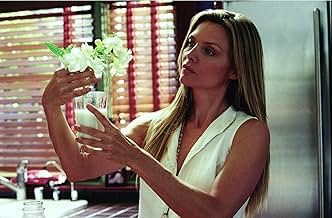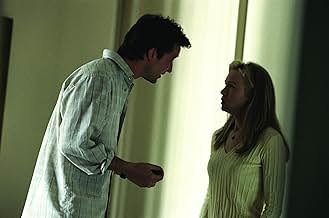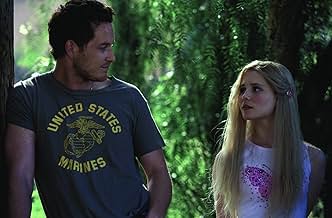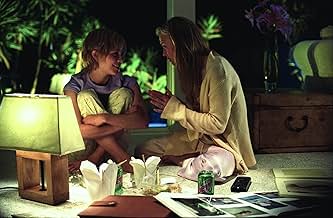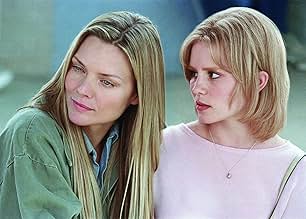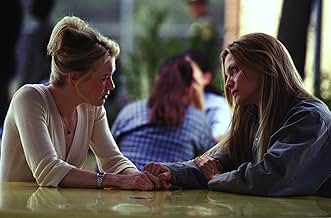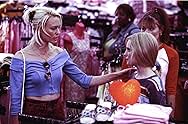NOTE IMDb
7,1/10
35 k
MA NOTE
Ajouter une intrigue dans votre langueA teenager journeys through a series of foster homes after her mother goes to prison for committing a crime of passion.A teenager journeys through a series of foster homes after her mother goes to prison for committing a crime of passion.A teenager journeys through a series of foster homes after her mother goes to prison for committing a crime of passion.
- Réalisation
- Scénario
- Casting principal
- Récompenses
- 3 victoires et 7 nominations au total
Robin Wright
- Starr
- (as Robin Wright Penn)
Avis à la une
Based on the same-titled novel by Janet Fitch, White Oleander tells the story of a teenage girl (Alison Lohman) struggling to survive in foster homes while her free-spirited mother (Michelle Phieffer) is in prison for having murdered her lover with the poisonous flower 'White Oleander'. It is a complex story of the relationship between a powerless girl and a loveless mother that, in spite of its cheesy sounding premise, manages to avoid all clichéd Hallmark moments and project quite a lot of heart in doing so.
White Oleander sees Alison Lohman in a superbly bruised and fragile performance as Astrid Magnussen and we follow her through her struggles, both to bond with her mother and to survive in foster cares. All developments in her life feel natural and genuine, for example seeking the affirmation of an older man (Cole Hauser) in one of her foster homes, and putting herself into a strangely Lolita-like situation -- and this part is viciously well-handled and more effective than any other teen girl/older man jail bait situation I have ever seen.
The film stars a wide variety of blondes, Michelle Phieffer, Alison Lohman, Robin Wright Penn and Renée Zellweger in different parts and they all feel appropriate. Phieiffer is proud, cold and heartless and this is juxtapositioned with Lohman's mildness and loving ways. White Oleander is a film that is indeed very sad, but does not purposely pull at the human race's collective heartstrings in every emotional scene and set-up. This way, in spite of its content, it never becomes sappy. It's not a film I would watch again however, and I would never recommend it to male viewers because it is very chick-oriented.
7/10
White Oleander sees Alison Lohman in a superbly bruised and fragile performance as Astrid Magnussen and we follow her through her struggles, both to bond with her mother and to survive in foster cares. All developments in her life feel natural and genuine, for example seeking the affirmation of an older man (Cole Hauser) in one of her foster homes, and putting herself into a strangely Lolita-like situation -- and this part is viciously well-handled and more effective than any other teen girl/older man jail bait situation I have ever seen.
The film stars a wide variety of blondes, Michelle Phieffer, Alison Lohman, Robin Wright Penn and Renée Zellweger in different parts and they all feel appropriate. Phieiffer is proud, cold and heartless and this is juxtapositioned with Lohman's mildness and loving ways. White Oleander is a film that is indeed very sad, but does not purposely pull at the human race's collective heartstrings in every emotional scene and set-up. This way, in spite of its content, it never becomes sappy. It's not a film I would watch again however, and I would never recommend it to male viewers because it is very chick-oriented.
7/10
White Oleander was a great book, but there are a few nagging omissions in the movie. For some reason, Michelle Pfeiffer is an artist and not a poet in the movie (was the focus group confused?) Noah Wyle's character's name changed from Ron to Mark for some unknown reason.
More importantly, so much was left out of the movie. Before Alison Lohman's character goes to Claire's place (Zellwegger's), she endures lots more than what the movie shows. There is zero mention of the Van Nuys house with the racist foster mom, the black woman next door, the next place which was the Argentinian woman who had a padlock on the fridge etc.. In the book, Claire's place was like an oasis of peace and tranquility, and love. This did not come through the way it should have. Claire was just a short episode in the movie too, which was wrong.
On the plus side the acting was great, Pfeiffer; beautiful but with that dagger glare; Wright Penn as the white trash hypocrite; Renee as the insecure actress and Alison Lohman as a girl going through foster homes and living in her own prison. Good enough movie if you haven't read the book, but a letdown for me.
More importantly, so much was left out of the movie. Before Alison Lohman's character goes to Claire's place (Zellwegger's), she endures lots more than what the movie shows. There is zero mention of the Van Nuys house with the racist foster mom, the black woman next door, the next place which was the Argentinian woman who had a padlock on the fridge etc.. In the book, Claire's place was like an oasis of peace and tranquility, and love. This did not come through the way it should have. Claire was just a short episode in the movie too, which was wrong.
On the plus side the acting was great, Pfeiffer; beautiful but with that dagger glare; Wright Penn as the white trash hypocrite; Renee as the insecure actress and Alison Lohman as a girl going through foster homes and living in her own prison. Good enough movie if you haven't read the book, but a letdown for me.
Strong performances by Lohman, Penn, Zellweger and especially Michelle Pfeiffer in a faithful adaptation of Janet Fitch's novel. Not hard to see why this one didn't attract more attention in theaters, since it lacks the ingredients that seem to characterize hit films nowadays -- such as action, violence, sex and stunning special effects. It's just a very moving story, well-crafted and well-acted. I'd recommend it to anyone.
The white oleander looks beautiful but its poison kills. Social service agencies take children from their abusive parents but place them in homes and institutions where violence reigns. Ingrid Magnussen (Michelle Pfeiffer) puts her daughter, Astrid (Alison Lohman), in the center of her artwork but pushes her to the perimeter of her reality. Life is a contradiction in which nothing is purely good or purely evil.
White Oleander is a story about life's contradictions and the complexities of control, power, loneliness, betrayal, loyalty, and love. Janet Fitch won rave reviews in 2000 for this novel; screenwriter Mary Agnes Donoghue did not match Fitch's brilliance, but turned a weighty narrative-both in terms of content and size-into an admirable film blueprint.
Director Peter Kosminsky and accomplished actresses Pfeiffer, Robin Wright Penn, Renée Zellweger, and newcomer Lohman used this blueprint to create a gripping film that both readers and nonreaders of the original text will appreciate.
Pfeiffer is as cool and controlling as she is stunning even in prison garb, and her mastery of personality subtleties deserves acclaim. Audiences will hate the character because she is too smart, too manipulative, and too real.
And anticipate an Oscar-worthy breakthrough performance from Lohman. She shines in her portrayal of a daughter who worships her mother until she realizes the superficial nature of her beauty and the cruelty of her heart. Ingrid Magnussen is not as perfect as she thinks, and her love is as poisonous as the white oleander.
Stereotypes cheapen some of the film's richness and choices made to avoid an `R' rating sap some of its strength, but overall the film is as compelling as its sad and truthful characters.
White Oleander is a story about life's contradictions and the complexities of control, power, loneliness, betrayal, loyalty, and love. Janet Fitch won rave reviews in 2000 for this novel; screenwriter Mary Agnes Donoghue did not match Fitch's brilliance, but turned a weighty narrative-both in terms of content and size-into an admirable film blueprint.
Director Peter Kosminsky and accomplished actresses Pfeiffer, Robin Wright Penn, Renée Zellweger, and newcomer Lohman used this blueprint to create a gripping film that both readers and nonreaders of the original text will appreciate.
Pfeiffer is as cool and controlling as she is stunning even in prison garb, and her mastery of personality subtleties deserves acclaim. Audiences will hate the character because she is too smart, too manipulative, and too real.
And anticipate an Oscar-worthy breakthrough performance from Lohman. She shines in her portrayal of a daughter who worships her mother until she realizes the superficial nature of her beauty and the cruelty of her heart. Ingrid Magnussen is not as perfect as she thinks, and her love is as poisonous as the white oleander.
Stereotypes cheapen some of the film's richness and choices made to avoid an `R' rating sap some of its strength, but overall the film is as compelling as its sad and truthful characters.
Although not a perfect film by any stretch (too many things happen without any seeming rationale behind them and some of the most important plot points are too vague), White Oleander still kept me intrigued, thanks mainly to the great performances by Pfeiffer (extraordinary in her restraint - brilliant characterization), Renee Zellweiger (achingly vulnerable here) and the extremely talented Alison Lohman (who's in nearly every scene and never hits a false note - and the fact that she sort of looks like Kirsten Dunst doesn't hurt either).
A lot of critics are saying the film is too melodramatic or not 'weepy' enough, when in fact I found the movie's greatest strength (along with the performances) to be in how UNmelodramatic it is; there's a lot of restraint taken in the scenes that could have played like an afternoon soap, and I also appreciated how the film DIDN'T wind up as a tearjerker but rather took a grittier approach by portraying Astrid as an ultimate survivor in her sad and lonely journey toward independence.
A lot of critics are saying the film is too melodramatic or not 'weepy' enough, when in fact I found the movie's greatest strength (along with the performances) to be in how UNmelodramatic it is; there's a lot of restraint taken in the scenes that could have played like an afternoon soap, and I also appreciated how the film DIDN'T wind up as a tearjerker but rather took a grittier approach by portraying Astrid as an ultimate survivor in her sad and lonely journey toward independence.
Le saviez-vous
- AnecdotesAlison Lohman wore a wig because she was bald throughout this movie, as she had just previously filmed a role as a cancer patient.
- GaffesWhen Astrid, Starr, and Carolee are driving to go get clothes, Starr refers to the reverend of their church as "Reverend Thomas." However, in every other scene before and after this, the reverend is referred to as "Reverend Daniels." Perhaps his name is Thomas Daniels.
- Versions alternativesAdditional scenes featured on the DVD release that is not from the final print:
- A scene where Astrid defends her brother (in the first foster home) after Starr beats him up.
- A scene immediately after featuring Astrid and her brother (still in the first foster home) lying to the parademic asking how he broke his arm.
- A scene where Claire can't decide which cereal they want to eat for breakfast and makes Astrid choose one.
- A scene featuring Claire and Astrid riding home in the car after visiting Ingrid (Michelle Pfeiffer). Claire tells Astrid what Ingrid told her.
- A scene where Astrid is drawing Claire's picture and Mark asking Astrid if she took his pen.
- A scene where Astrid leaves to go back to Mac. Mark asks Astrid if she wants to go to Claire's funeral in which she declines to. He then gives her a lot of money before getting to the van.
- ConnexionsFeatured in HBO First Look: The Journey of 'White Oleander' (2002)
Meilleurs choix
Connectez-vous pour évaluer et suivre la liste de favoris afin de recevoir des recommandations personnalisées
- How long is White Oleander?Alimenté par Alexa
Détails
- Date de sortie
- Pays d’origine
- Site officiel
- Langues
- Aussi connu sous le nom de
- Déjame vivir
- Lieux de tournage
- Sociétés de production
- Voir plus de crédits d'entreprise sur IMDbPro
Box-office
- Budget
- 16 000 000 $US (estimé)
- Montant brut aux États-Unis et au Canada
- 16 357 770 $US
- Week-end de sortie aux États-Unis et au Canada
- 5 607 480 $US
- 13 oct. 2002
- Montant brut mondial
- 21 672 284 $US
- Durée
- 1h 49min(109 min)
- Couleur
- Mixage
- Rapport de forme
- 1.85 : 1
Contribuer à cette page
Suggérer une modification ou ajouter du contenu manquant







